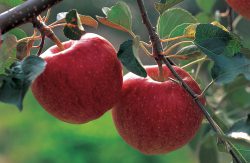Move over, Shark Week, now there’s something fruitier – and longer. October is National Apple Month, a celebration of America’s favorite pie-filling (not to mention, catalyst in gravity’s origin story). This is the month that we honor Johnny Appleseed and keep doctors away, daily, but just how healthy are apples?
Very. According to MedicalNewsToday, apples help to improve neurological health, prevent dementia, reduce the risk of stroke, cancer and diabetes, lower levels of bad cholesterol and counter obesity.
 In addition, apples contain:
In addition, apples contain:
- Vitamin C, which is a powerful natural antioxidant experts believe capable of blocking partial damage caused by free radicals, as well as boosting the body’s resistance against infectious agents.
- B-complex vitamins (riboflavin, thiamin, and vitamin B-6) which are key in maintaining red blood cells and a healthy nervous system.
- Dietary fiber, which experts believe can help prevent the development of certain diseases and may help prevent the amount of bad cholesterol in your blood from rising.
- Phytonutrients that help protect the body from the detrimental effects of free radicals.
- Minerals such as calcium, potassium, and phosphorus.
But that’s not all! Best Health reports even more benefits from eating apples, including:
- Eating apples can help you get whiter, healthier teeth. The biting and chewing of apple stimulates the production of saliva in your mouth, reducing tooth decay by lowering the levels of bacteria.
- Avoid Alzheimer’s — a new study performed on mice shows that drinking apple juice could keep Alzheimer’s away and fight the effects of aging on the brain. Mice in the study that were fed an apple-enhanced diet showed higher levels of the neurotransmitter acetylcholine and did better in maze tests than those on a regular diet.
- Protection against Parkinson’s — research shows that people who eat fruits and other high-fiber foods gain protection against Parkinson’s, a disease characterized by a breakdown of the brain’s dopamine-producing nerve cells..
- Get a healthier heart — extensive research has suggested that high soluble fiber intake results in a slower buildup of cholesterol-rich plaque in arteries. The phenolic compound found in apple skins also prevents the cholesterol that gets into your system from solidifying on your artery walls. When plaque builds inside your arteries, it reduces blood flow to your heart, leading to coronary artery disease.
-

Don’t eat the seeds (they contain cyanide), but the peel is A-OK! Prevent gallstones that form when there is too much cholesterol in your bile for it to remain as a liquid, so it solidifies. They are particularly prevalent in the obese. To prevent gallstones, doctors recommend a diet high in fiber to help you control your weight and cholesterol levels.
- Beat diarrhea and constipation — whether you can’t go to the bathroom or you just can’t stop, fiber found in apples can help. Fiber can either pull water out of your colon to keep things moving along when you’re backed up, or absorb excess water from your stool to slow your bowels down and neutralize irritable bowel syndrome.
- Avert hemorrhoids, which are painful, swollen veins in the anal canal. They are caused by too much pressure in the pelvic and rectal areas. Part and parcel with controlling constipation, fiber can prevent you from straining too much when going to the bathroom and thereby help alleviate hemorrhoids.
- Detoxify your liver, whether it is from drinks or food, our bodies are full of toxins, and the liver is responsible for clearing these toxins out of your body. Eating apples can help detoxify your liver.
- Boost your immune system — red apples contain an antioxidant called quercetin. Recent studies have found that quercetin can help boost and fortify your immune system, especially when you are stressed out, which, let’s face it, is often.
- Prevent cataracts with a diet rich in fruits that contain antioxidants — like apples — and you can be 10 to 15 per cent less likely to develop cataracts.
Fun fact, most of the fiber and antioxidants are in the peel of the apple, and, contrary to popular belief, there is little to no risk of encountering pesticides on the peel. However, apple seeds contain the deadly poison cyanide and should not be eaten. Consuming apple seeds can cause illness or death.
So there you have it. Apples, aside from the seeds, are very good for you, and while they may not keep the doctor away, they certainly offer a number of ways to improve your health.
How about them apples?










